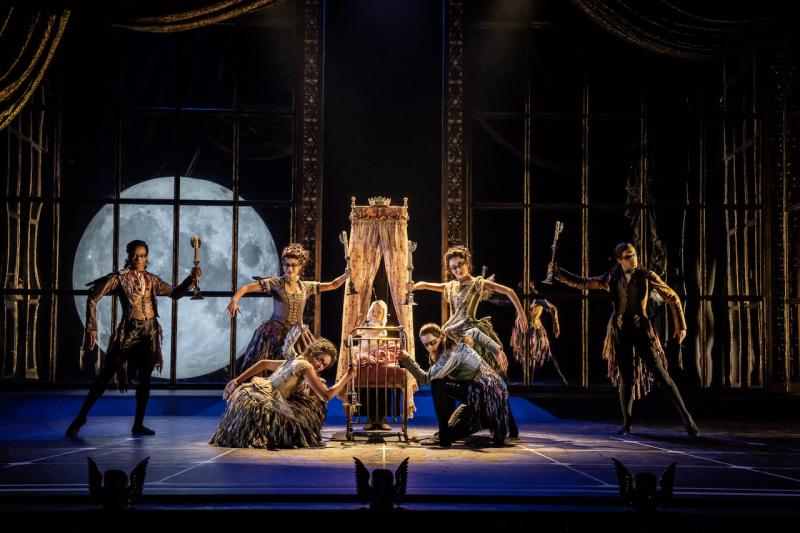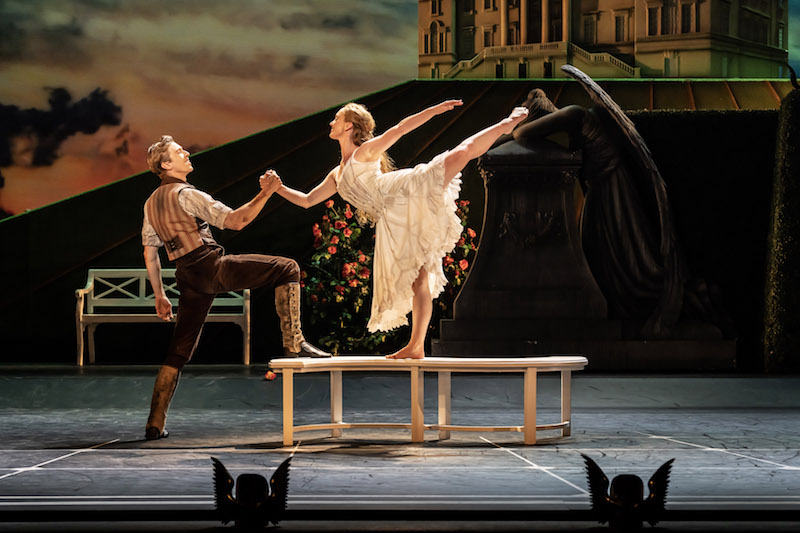Matthew Bourne's Sleeping Beauty, Sadler's Wells review - a gothic romance with loads of goth and not much love | reviews, news & interviews
Matthew Bourne's Sleeping Beauty, Sadler's Wells review - a gothic romance with loads of goth and not much love
Matthew Bourne's Sleeping Beauty, Sadler's Wells review - a gothic romance with loads of goth and not much love
Revival of Bourne's vampire ballet drives a stake through the heart of Beauty

Matthew Bourne is not the first choreographer to tinker with the story of The Sleeping Beauty and he won't be the last, such is the lure of Tchaikovsky's score and the potency of the plot.
Good and evil, beauty and decrepitude, the suspended animation of adolescence – these are themes that will always invite a fresh spin. But Bourne’s version, now on its third season at Sadler’s Wells, signally fails to shed any new light on the archetypal tale of youth and hope triumphing over old grudges. The old ballet does this very well, some would say definitively. But by imposing an alien aesthetic on the story – his is a vampire Sleeping Beauty – Bourne muddies the moral certainties and throws narrative logic out of the window.
On paper, however, the chronology is neat. Opening the action in 1890, the date of the ballet’s premiere, and pushing on to Aurora's 21st birthday in 1911, when she pricks her finger and falls asleep for 100 years, embraces not one but two gothic crazes. Bram Stoker's Dracula was published in 1897. A hundred years later the Twilight Saga and Vampire Diary series took off. So far, so zeitgeisty. The trouble is that The Sleeping Beauty, like all the best fairytales, is about fundamentals – light overcoming darkness, good banishing evil. Turning every character bar the parents into a vampire makes nonsense of all that. Visually, too, despite the economical yet opulent sets by Lez Brotherston, there is muddle. Even once you get the joke that every one of the fairies bestowing gifts on the baby Aurora is gothed up to look like Helena Bonham Carter on a girls’ night out, it remains unclear for far too long which of them is the equivalent of the Lilac Fairy whose pivotal purpose is to reverse the deadly curse of Carabosse. That character’s wickedness is far harder to signal now that everyone's wearing sooty eye makeup.
Visually, too, despite the economical yet opulent sets by Lez Brotherston, there is muddle. Even once you get the joke that every one of the fairies bestowing gifts on the baby Aurora is gothed up to look like Helena Bonham Carter on a girls’ night out, it remains unclear for far too long which of them is the equivalent of the Lilac Fairy whose pivotal purpose is to reverse the deadly curse of Carabosse. That character’s wickedness is far harder to signal now that everyone's wearing sooty eye makeup.
The choreography nods to Marius Petipa’s original steps with no clear rationale, sometimes paraphrasing, other times quoting chunks. The fairies’ solos are clearly meant as a homage to the great Imperial stepsmith, but only draw attention to the fact that the cast are not ballet dancers, nor very precise in their movements. The exception is Ashley Shaw’s Aurora, a peach of a princess who makes every step look gorgeous, along with those of her homespun beau, the palace gamekeeper (Andrew Monaghan, pictured above with Shaw). There is also some good material for Paris Fitzpatrick doubling as bad fairy Carabosse and her vampiric son Caradoc, a surprise alternative suitor who craves marriage to Aurora for reasons that will either make you howl or want to leave the theatre.
If brash and loud is you bag, you may not mind the recorded music, a rearranged version of Tchaikovsky’s score, brisky conducted by Brett Morris, but relayed at such volume that it often distorts. Also questionable, to my mind, is the addition of thunder and lightning effects to music that’s already bursting with such imagery, if only we could hear it. As is so often the case with Bourne's productions, the best bits are not the big set pieces but the snatches of interim business: squabbles between the palace servants, their attempts to soothe the cranky baby princess, the rod-puppet baby itself, who completely steals the scene. What’s gone AWOL is the heart of the story. The Royal Ballet’s revival of its retro Beauty early next year can't come soon enough for me.
rating
Share this article
The future of Arts Journalism
You can stop theartsdesk.com closing!
We urgently need financing to survive. Our fundraising drive has thus far raised £49,000 but we need to reach £100,000 or we will be forced to close. Please contribute here: https://gofund.me/c3f6033d
And if you can forward this information to anyone who might assist, we’d be grateful.

Subscribe to theartsdesk.com
Thank you for continuing to read our work on theartsdesk.com. For unlimited access to every article in its entirety, including our archive of more than 15,000 pieces, we're asking for £5 per month or £40 per year. We feel it's a very good deal, and hope you do too.
To take a subscription now simply click here.
And if you're looking for that extra gift for a friend or family member, why not treat them to a theartsdesk.com gift subscription?
more Dance
 'We are bowled over!' Thank you for your messages of love and support
Much-appreciated words of commendation from readers and the cultural community
'We are bowled over!' Thank you for your messages of love and support
Much-appreciated words of commendation from readers and the cultural community
 R:Evolution, English National Ballet, Sadler's Wells review - a vibrant survey of ballet in four acts
ENB set the bar high with this mixed bill, but they meet its challenges thrillingly
R:Evolution, English National Ballet, Sadler's Wells review - a vibrant survey of ballet in four acts
ENB set the bar high with this mixed bill, but they meet its challenges thrillingly
 Like Water for Chocolate, Royal Ballet review - splendid dancing and sets, but there's too much plot
Christopher Wheeldon's version looks great but is too muddling to connect with fully
Like Water for Chocolate, Royal Ballet review - splendid dancing and sets, but there's too much plot
Christopher Wheeldon's version looks great but is too muddling to connect with fully
 iD-Reloaded, Cirque Éloize, Marlowe Theatre, Canterbury review - attitude, energy and invention
A riotous blend of urban dance music, hip hop and contemporary circus
iD-Reloaded, Cirque Éloize, Marlowe Theatre, Canterbury review - attitude, energy and invention
A riotous blend of urban dance music, hip hop and contemporary circus
 How to be a Dancer in 72,000 Easy Lessons, Teaċ Daṁsa review - a riveting account of a life in dance
Michael Keegan-Dolan's unique hybrid of physical theatre and comic monologue
How to be a Dancer in 72,000 Easy Lessons, Teaċ Daṁsa review - a riveting account of a life in dance
Michael Keegan-Dolan's unique hybrid of physical theatre and comic monologue
 A Single Man, Linbury Theatre review - an anatomy of melancholy, with breaks in the clouds
Ed Watson and Jonathan Goddard are extraordinary in Jonathan Watkins' dance theatre adaptation of Isherwood's novel
A Single Man, Linbury Theatre review - an anatomy of melancholy, with breaks in the clouds
Ed Watson and Jonathan Goddard are extraordinary in Jonathan Watkins' dance theatre adaptation of Isherwood's novel
 Peaky Blinders: The Redemption of Thomas Shelby, Rambert, Sadler's Wells review - exciting dancing, if you can see it
Six TV series reduced to 100 minutes' dance time doesn't quite compute
Peaky Blinders: The Redemption of Thomas Shelby, Rambert, Sadler's Wells review - exciting dancing, if you can see it
Six TV series reduced to 100 minutes' dance time doesn't quite compute
 Giselle, National Ballet of Japan review - return of a classic, refreshed and impeccably danced
First visit by Miyako Yoshida's company leaves you wanting more
Giselle, National Ballet of Japan review - return of a classic, refreshed and impeccably danced
First visit by Miyako Yoshida's company leaves you wanting more
 Quadrophenia, Sadler's Wells review - missed opportunity to give new stage life to a Who classic
The brilliant cast need a tighter score and a stronger narrative
Quadrophenia, Sadler's Wells review - missed opportunity to give new stage life to a Who classic
The brilliant cast need a tighter score and a stronger narrative
 The Midnight Bell, Sadler's Wells review - a first reprise for one of Matthew Bourne's most compelling shows to date
The after-hours lives of the sad and lonely are drawn with compassion, originality and skill
The Midnight Bell, Sadler's Wells review - a first reprise for one of Matthew Bourne's most compelling shows to date
The after-hours lives of the sad and lonely are drawn with compassion, originality and skill
 Ballet to Broadway: Wheeldon Works, Royal Ballet review - the impressive range and reach of Christopher Wheeldon's craft
The title says it: as dancemaker, as creative magnet, the man clearly works his socks off
Ballet to Broadway: Wheeldon Works, Royal Ballet review - the impressive range and reach of Christopher Wheeldon's craft
The title says it: as dancemaker, as creative magnet, the man clearly works his socks off
 The Forsythe Programme, English National Ballet review - brains, beauty and bravura
Once again the veteran choreographer and maverick William Forsythe raises ENB's game
The Forsythe Programme, English National Ballet review - brains, beauty and bravura
Once again the veteran choreographer and maverick William Forsythe raises ENB's game

Add comment